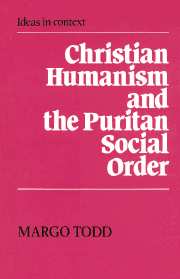Book contents
- Frontmatter
- Contents
- preface
- Abbreviations
- 1 Introduction: The demythologizing of puritanism
- 2 Christian humanism as social ideology
- 3 The transmission of Christian humanist ideas
- 4 The spiritualized household
- 5 Work, wealth and welfare
- 6 Conscience and the Great Chain of Being
- 7 The conservative reaction: Trent, Lambeth and the demise of the humanist consensus
- Bibliography
- Index
3 - The transmission of Christian humanist ideas
Published online by Cambridge University Press: 06 July 2010
- Frontmatter
- Contents
- preface
- Abbreviations
- 1 Introduction: The demythologizing of puritanism
- 2 Christian humanism as social ideology
- 3 The transmission of Christian humanist ideas
- 4 The spiritualized household
- 5 Work, wealth and welfare
- 6 Conscience and the Great Chain of Being
- 7 The conservative reaction: Trent, Lambeth and the demise of the humanist consensus
- Bibliography
- Index
Summary
The impact of Christian humanist reforms on university curriculum and pedagogy during the Henrician and Edwardian periods has been described at some length because of the importance of the university experience of later puritan divines for the formation of puritan social thought. The sermon was, after all, the primary vehicle by which ideas were propagated in early modern England, especially among fervent protestants. An increasingly literate populace read printed sermons (frequently aloud, to less educated auditors), and sermon and lecture attendance was a popular form of entertainment among the hotter sort of protestants. The sources of ideas being transmitted to the puritan laity must, therefore, be traced to the intellectual background of the preachers. Now while this can be accomplished in some measure by looking at the marginal notes of printed sermons, the puritans’ predilection for Scriptural authority often precluded a methodical listing of extra-biblical sources in their notes. It is necessary, then, to discover the writings which conditioned the way puritans used Scripture by looking at their library catalogues, their commonplace books and correspondence, and (most importantly) the curriculum to which they devoted their university years. It will be seen that for at least the century and a half following Erasmus’ death, puritan readers were entirely typical of their less zealous contemporaries in imbibing large quantities of humanist literature, and that their taste for it had been developed in part by their educational experiences.
- Type
- Chapter
- Information
- Christian Humanism and the Puritan Social Order , pp. 53 - 95Publisher: Cambridge University PressPrint publication year: 1988



